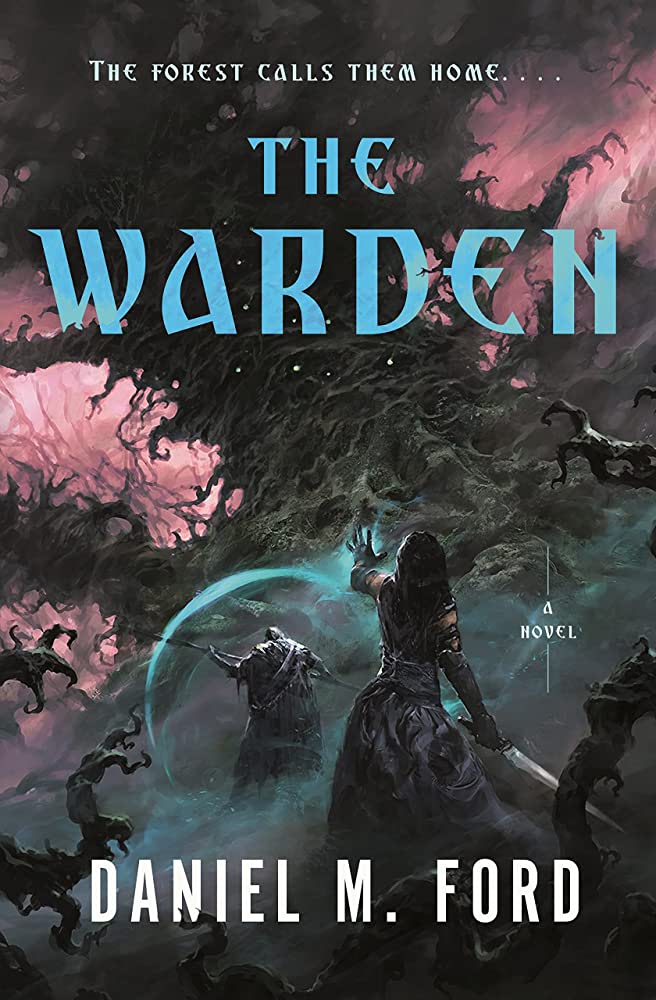I am a sucker for fantasy adventure stories. I’m a sucker for necromancers as protagonists. Between all that and my considerable experience with the fantasy genre, The Warden by Daniel M. Ford seemed made for me. Though settling in was a little bumpy, once I was in I was hooked.
Our protagonist Aelis is an abundantly talented graduate of the magic colleges of her kingdom, passing the criteria for three schools of magic instead of the more normal one. She’s also the wealthy daughter of a count, and somewhere between arrogant and a prick. Expecting to receive a duty post in the posh center of a city, she’s horrified to find herself assigned to the back end of nowhere—a little town called Lone Pine, out in the borderlands. Once there she must confront the ignominy of peasant life, goats, and maybe a looming mystery or two, while doing her best to live up to the expectations of her role as Warden, the protector and local arbiter for the town.

I had a lot of fun with The Warden. This book offers so much of what I love. And yet, I was also frustrated by it, perhaps because I’m not quite the target audience.
I grew up reading old ’70s and ‘80s SFF, along with (often abridged) classic sci-fi and adventure stories from Jules Verne and Sir Arthur Conan Doyle. Occasionally, these books had decent non-male characters. Most did not. Often enough, the novels were only marginally better than their pruriently illustrated covers.
So it’s refreshing to read a fantasy adventure with a female main character who feels realistic. Aelis has a lot to learn about the world. Her understanding of life on the border is mostly academic. Relatedly, she’s sometimes an ass in very believable ways. But her abiding desire to do well by others tempers my frustrations with her. Also, she experiences her own sexuality without that feeling like it’s been written for the readers’ (or writer’s) voyeuristic pleasure.
For that matter, the book does a marvelous job with making sexuality both explicitly present and a non-issue. Aelis is bi and has had multiple partners, and that is perfectly fine in this world. There’s a gay couple who run the local tavern, and their gay-ness is never an issue or a defining character element, simply a fact. The two tavern keepers are both veterans; one is friendly and outgoing, the other is an Eeyore-ish perfectionist, and they each bear their wartime experience differently. They might be my two favorite characters.
That wartime experience weighs on the townsfolk of Lone Pine, and on others. It takes the shape of old resentments, of difficult neuroses and reflexes. Perhaps most poignantly, it’s visible in the pair of uncles struggling to raise their (dead) third brother’s child. The uneven but omnipresent weight of the last war feels especially well done. I appreciate Ford’s attention to it. Many fantasy stories include recent wars in their backstories, but never take time to show the impact on the people.

That quiet but ever-present attention to these details, to the setting’s implications, is actually one of the things I missed at first. My appreciation for Ford’s story grew over the course of the book as I slowly came to recognize that attention. Those details became visible in part because so much of this book is almost a slice-of-life frontier fantasy story. Yes, there are more dramatic things that arise, but the core of the book—maybe two-thirds of it—is tied up in Aelis’s struggle with settling into an impoverished town on the edge of the kingdom, and her struggle to deal justly with the town’s inhabitants without compromising her office of authority.
These qualities make The Warden precisely my jam. I love finding them in this fantasy adventure. And I think, for the most part, this book would be a great jumping off point for new readers of the genre.
So where’s my frustration coming from?
Because I’m so familiar with regular fantasy genre tropes, it took me a long time to realize that Ford was doing anything novel (heh). So much of the world building that Ford does throughout the start of the book feels utterly in line with bog standard fantasy. I even wondered for a while whether it was an outgrowth of a D&D campaign. There’s nothing wrong with that, but I’d thought I was getting something a little different.
As it turns out, I was. But I was deep into the book before I recognized that, or had a chance to see the ways in which Ford’s setting diverged from what I’d expected. I’d almost accuse Ford of burying the lede.
To be clear, there is interesting stuff going on here! Ford establishes cool material for later, and he builds it atop the setting’s relatively recent history. I actually really enjoyed the ways in which Aelis’s perspective simply assumes that the past is the past and needn’t influence the near future. That assumption makes her slow recognition of approaching badness all the more satisfying.
For now, just understand that a lot of the world building for this book will feel very familiar if you’re deep into the fantasy genre. I got over the hump and really liked the story, but it took me a while to fall in and just enjoy.
My biggest obstacle to simply falling into the book? Craft.
The narrator’s perspective rides close over-the-shoulder for roughly the first half of the book, rarely catching the full thoughts of our POV character Aelis. Instead, Aelis talks to herself a considerable amount. She speaks necessary exposition without an apparent motivation to share that information. She does this while alone.
Look, I talk to myself too. But I don’t think people usually cover all the plot relevant background information while speaking aloud to themselves. That’s not a frequent occurrence, right?
Bald-faced spoken exposition is clunky and awkward, and a pet peeve of mine. It’s worse when a character is talking to themself. I saw edits that could have delivered all that exposition without the narrative strain of expository muttering, if only the reader could be inside Aelis’ head or another character were present. This wasn’t put-the-book-down bad for me, but it grated. I figured Ford was drawing a line by having Aelis speak aloud but not revealing her inner thoughts. I accepted that as a stylistic choice.
Imagine my surprise and frustration when I found out I was wrong. It wasn’t a stylistic choice. Later on in the book, we can read Aelis’ internal monologue. Ford even uses Aelis’s internal monologue effectively to share exposition, without all the clunkiness from before. It was a huge improvement, and I was so glad that Ford was moving away from his expository monologuing. But that just made the start of the book feel worse by comparison.
Then, there were the troublesome flashbacks, which appeared a number of times. Aelis often slipped into reverie, almost always with flashbacks to her time in magic college.
Some of those flashbacks felt unforced, pulled into the present by some detail or relevant fact. They slipped into and out of the narrative seamlessly with smooth transitions into and out of memory.
But many felt thinly connected to the narrative’s present moment at best. They often didn’t directly impinge on the story at the time they were included. Plus, so many of them focused on magic college that I wondered about what importance Aelis gave the rest of her life.
Despite all that, the flashbacks’ exposition was important. They (usually) included information that was useful or relevant later, and I can seewhy Ford felt the need to share most of that material with the reader. I just wanted the material to be introduced more seamlessly.
For all my obsessing, neither of these things that snagged me actually derail the book. The story is still a fun one, even with sometimes-clunky exposition and oddly placed flashbacks.
For a less critical audience, or for someone trying to get into fantasy adventure stories, The Warden seems like an excellent starting point. It’s a solid entry into the wider array of fantasy fiction; it has pitfalls of its own, but it avoids the most grievous ones of prior generations. In many ways, it feels like a reliable replacement for some of the fantasy books that I grew up reading. I know it’s not YA but it’s the kind of adventure fiction that young Henry would have gobbled up.
Now, just two last threads to tie up. First, Aelis’s struggle to deal justly with the town’s inhabitants without compromising her office of authority brings me to another potential critique. Then, my belief that Ford’s world building will continue to pay out actually hides a second critique.
Aelis’s struggles with justice, kindness, and authority derive from the fact that she’s more or less a cop stand-in. Is this story copaganda? Probably. I’m not a fan of that. On the other hand, the setting’s conception of a Warden doesn’t neatly parallel our modern American police. It exists in a similar mythology, tapping into what I see as the Western genre’s lawman / sheriff archetype before going its own way. Thus while it doesn’t engage much with critiques of law enforcement or the abuse of power, it’s just distinct enough that it doesn’t feel like an apologia for police either. It’s a mixed bag.
As for the world building paying off… look, the story ends in a cliffhanger. Unlike the other series-entries I’ve read lately, this is one of those books that left me gnashing my teeth.
I had fallen into the book. I’d gotten over the frustrations I mentioned above and was really enjoying myself. Then an inciting incident happened at the end of the book, and the story immediately ended with a “catch us next time” tag and the title of the sequel.
That felt both wrong and appropriate. Wrong, because damn it I want the next chunk of story now thank you very much. Appropriate because, well, it’s clearly the right point in the story for this to happen. Many other things had to happen first—both to set the stage, and to give sufficient emotional context and connection to the characters. If Ford had leapt to this point earlier, I wouldn’t have been so emotionally invested.
As it stands, I earnestly hope that there are more books coming down the pipe fast. This feels cheeky in the extreme—it’s been a while since I was so thoroughly cliffhanger’d by a book. But beyond my indignance, I like where the story is by the end. If I didn’t like it so much, I’d be far less cranky about the lack of “more.”
The Warden will be released on April 18, 2023.
